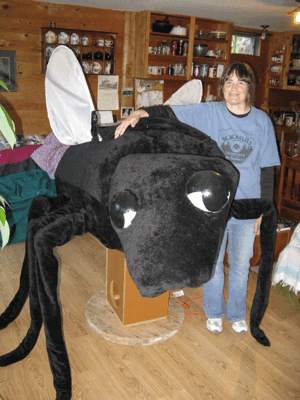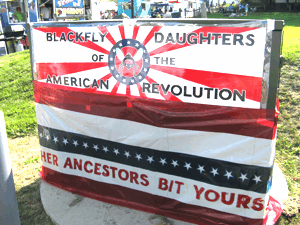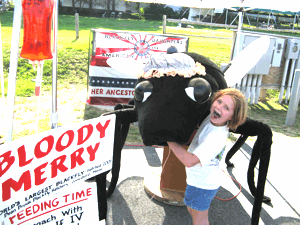In Praise of Blackflies
Air Date: Week of July 2, 2010

Marilyn Dowling and her housemate, Bloody Merry (Photo: Laurie Sanders)
Blackflies are much maligned, and that's something members of the Blackfly Breeders Association want to change. The Maine group has more than 1,000 members and, with tongue-in-cheek humor, campaigns to boast the virtues of the insect that most people love to hate. Laurie Sanders has our story.
Transcript
YOUNG: People love to hate blackflies. They feed on the blood of animals – including people - and many states have programs to eradicate them. But one group in Maine believes if you can’t beat ‘em, join ‘em. Laurie Sanders has our story.
SANDERS: If you really wanna know what Maine is like, Marilyn Dowling says, you’ve got experience it in blackfly season.
DOWLING: The East Machias River is one of the best blackfly hatcheries around. It’s clean water, it’s flowing briskly, and we have the most incredible swarm here every year.
SANDERS: And she’s right. Within moments, a cloud of blackflies starts to gather around us. They’re all females, each one seeking a blood meal to enrich her eggs that she will soon be laying.
DOWLING: I notice you have a few bites today. You have two good ones right behind your ear. That’s a status symbol, having the two bites behind the ear like that.

(Photo: Laurie Sanders)
SANDERS: A status symbol, at least according to Dowling. She is one of the key members of the Maine’s Blackfly Breeders Association. A group unlike any other in the country, and that now boasts more than 1,000 members. The group actually began as a complete joke 15 years ago. The founder began it by writing fake press releases and tongue in cheek ads for the local papers about the virtues of blackflies. And, Dowling says, it was a way to bring some humor into a season, that most people, whether they’re tourists or locals, just suffer through. And, Dowling likes to play it up. Tacked on the side of her house is a sign that reads: Top Secret Research Facility.
DOWLING: This is the Bean Brook Blackfly Hatchery. There’s a brook down through those trees, and, sometimes you have to keep the location of the hatchery secret because there’s some misunderstanding sometimes, there’s a little hostility towards the blackfly.
SANDERS: Probably more than a little. But kidding aside, Dowling says blackflies do have a role in the natural world. They’re indicators of clean, running water, they play a valuable part of the food chain, and male blackflies are credited with some of the pollination of wild blueberries, which is significant here in Washington County. This part of Maine produces 85% of the world’s wild blueberry crop. In her day to day life, Dowling is an artist.

Bloody Merry and a fan at the Machais Blueberry Festival. (Photo: Laurie Sanders)
[SOUND OF DOOR OPENING]
SANDERS: Stepping inside her house, she points out the blackfly village she built, a collection of miniature, hand-painted, wooden buildings.
DOWLING: Here we have the Blackfly Riverside Motel. Clean running water. Cable TV. Continental breakfast, which is tourists. This is a condo unit. And here’s the Blackfly Bloodbank and Trust, with the fly-up teller.
SANDERS: Dowling has also designer T-shirts, bumper stickers, magnets and coffee cups with slogans like Save the Blackfly, We breed’em, you feed’em, and Fatten, Don’t Flatten. All of this is for sale, but not to raise money for the association. Holly Garner Jackson says, in the last decade, the association has donated more than $40,000 to a variety of charities.

Marilyn Dowling and her housemate, Bloody Merry
(Photo: Laurie Sanders)
JACKSON: We’ve given to the Quoddy Regional Land Trust. We’ve given to the Great Auk Land Trust.
SANDERS: The Blackfly Breeders Association has also made gifts to area libraries. Animal shelters, food pantries and many others.
JACKSON: We do where we can. We’re trying to keep it local, because Washington County is where we live, and where we breed blackflies, and where they pollinate the blueberries. So we’re giving back to the community, that has supported us, and we laugh with them, and they laugh with us.
SANDERS: And one reason they laugh is because of Bloody Merry. That’s M-E-R-R-Y, and right now, she’s resting up, on Dowling’s couch.
DOWLING: Yeah, it’s hard to miss her. Kind of like the elephant in the living room, right. Only it’s a blackfly and she’s 9 feet long. She takes up the whole couch. I built her in the living room one winter. Some people say, ‘your winters are way too long.’
.gif)
Holly Garner Jackson and Marilyn Dowling all sorts of blackfly memorabilia at the MBBA's "secret" headquarters in Machias, ME.
(Photo: Laurie Sanders)
SANDERS: Dowling built her four years ago out of local and recycled materials. And Merry is a work of art. A favorite at parades and conferences. And she’s mechanized.
DOWLING: Bloody Merry, don’t panic. We’re just going to move you.
[SOUND OF GIANT BLACKFLY BEING MOVED)
SANDERS: We clear away the furniture, and shift her to her pedestal.
DOWLING: You should stand back, or you’re gonna get hit by a wing.
[SOUND OF FLAPPING]
SANDERS: Dowling plugs her in, and Merry starts flapping away.
DOWLING: Oh there she goes. A lot of children just love her and they just run up and give her a big hug. I think she’s doing a lot for public relations between humans and blackflies.
SANDERS: Bloody Merry will be making several appearances at festivals around Maine this summer. For Living on Earth, I’m Laurie Sanders. And, may the swarm be with you.
Links
Living on Earth wants to hear from you!
Living on Earth
62 Calef Highway, Suite 212
Lee, NH 03861
Telephone: 617-287-4121
E-mail: comments@loe.org
Newsletter [Click here]
Donate to Living on Earth!
Living on Earth is an independent media program and relies entirely on contributions from listeners and institutions supporting public service. Please donate now to preserve an independent environmental voice.
NewsletterLiving on Earth offers a weekly delivery of the show's rundown to your mailbox. Sign up for our newsletter today!
 Sailors For The Sea: Be the change you want to sea.
Sailors For The Sea: Be the change you want to sea.
 The Grantham Foundation for the Protection of the Environment: Committed to protecting and improving the health of the global environment.
The Grantham Foundation for the Protection of the Environment: Committed to protecting and improving the health of the global environment.
 Contribute to Living on Earth and receive, as our gift to you, an archival print of one of Mark Seth Lender's extraordinary wildlife photographs. Follow the link to see Mark's current collection of photographs.
Contribute to Living on Earth and receive, as our gift to you, an archival print of one of Mark Seth Lender's extraordinary wildlife photographs. Follow the link to see Mark's current collection of photographs.
 Buy a signed copy of Mark Seth Lender's book Smeagull the Seagull & support Living on Earth
Buy a signed copy of Mark Seth Lender's book Smeagull the Seagull & support Living on Earth

